ChatGPT & SEO Content Chaos: Can AI Writing Sabotage Your Rankings?
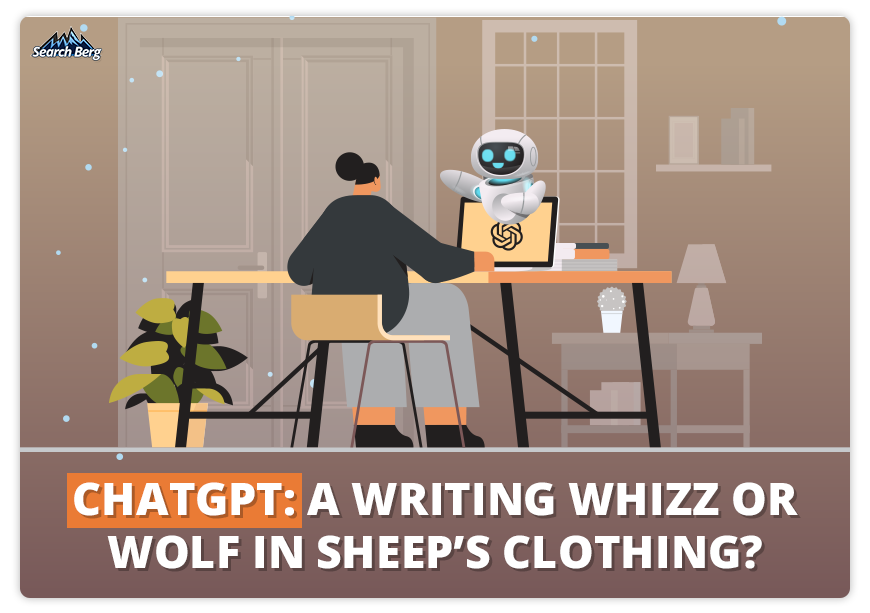
If you haven’t heard of ChatGPT yet, there’s only one explanation for it: you’ve been hiding under a rock.
Since its official launch in November 2022, ChatGPT has quite simply taken over. People have their own nicknames for it at this point; it’s become that commonplace. The AI-powered natural language processing tool boasts a human touch that we’ve never seen before, at least not like this.
It allows you to have human-like conversations and fetch quality results without the usual robotic monotony language models are known for. You can do pretty much anything: compose emails, whip up blogs, solve math problems, write code, craft business plans, and the like.
Think of ChatGPT as a hyper-smart writing assistant that brings expertise, personalized insights, and fresh ideas to the table.
Sounds like the ultimate tool, right?
Well…not quite.
The AI writing and SEO content marriage doesn’t work well, and it’s easy to see why.
In this blog, we’ll offer a complete breakdown of ChatGPT, its dark underbelly, content quality (with regard to E-E-A-T and Google’s Helpful Content Update), and the effect of AI-generated content on Google SERP rankings, and the future of SEO content writing.
Let’s begin!
The Inner Workings of ChatGPT
Every business wants to elevate its performance and reduce unnecessary expenditure.
When ChatGPT first entered the scene, it caused a lot of jaws to drop because of how effortlessly and swiftly it checked this box off the list.
And the numbers prove that!
By the end of 2023, OpenAI (the creator of ChatGPT) is expected to put more than $200 million into its pocket. By 2024, this number will increase to $1 billion.
None of this is shocking.
ChatGPT (Generative Pretrained Transformer) is easily the most impressive AI chatbot today. It’s not a gimmick; it’s a power-packed tool that taps into the strengths of AI technology in ways we’ve never seen before.
Soon after ChatGPT’s launch, Microsoft recognized its potential and invested $10 billion into OpenAI. Microsoft then added ChatGPT to Bing, Skype, and its Office suite (notably Word, Excel, Powerpoint, and Outlook) as part of a larger set of AI-driven changes it termed Copilot.
ChatGPT is making big waves, and justifiably so.
Let’s understand how it works.
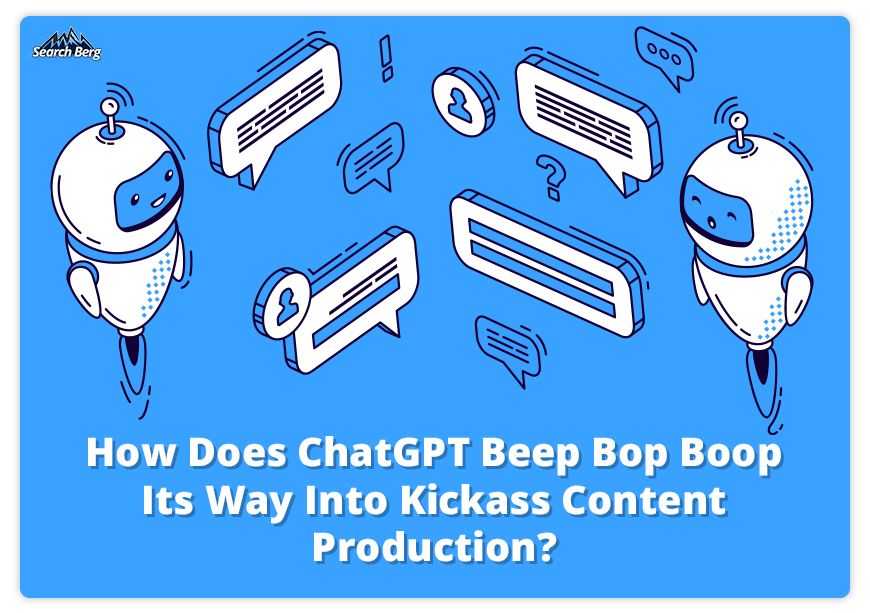
Before we jump into the GPT scape, let’s quickly look at Google first. Any time you search for something, Google starts scanning the web for relevant, accurate, helpful, and value-added answers.
Google scours its database to find pages that match your request as closely as possible. This process occurs in two parts: the data collection stage and the user interaction stage.
ChatGPT works pretty similarly.
The data collection stage is called pre-training, while the lookup stage is called interference.
ChatGPT does this brilliantly.
The whip-smart tool has been trained to learn a mapping function that precisely maps inputs to outputs. It’s been fed tons and tons of data and given the ability to detect patterns, make sense of queries on its own, and provide personalized responses.
This is where the slippery slope begins.
No matter how robust an AI model may be, it has its limitations. It’s an AI program, after all, not a human. The creators are aware of ChatGPT’s shortcomings, and they’re pretty honest about them.
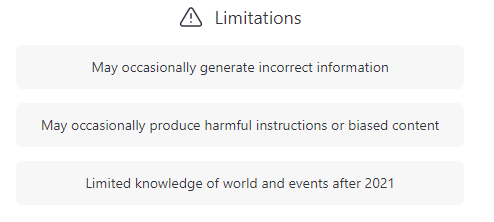
Yes, putting all your content-writing eggs in the ChatGPT basket may sound like a clever idea. Churn out tons of content, save money, and grow your business.
Sweet, right?
Well, there’s a lot at stake. If you end up releasing inaccurate, misinformed, or outdated content, your reputation will take a hit.
Here’s what we mean:
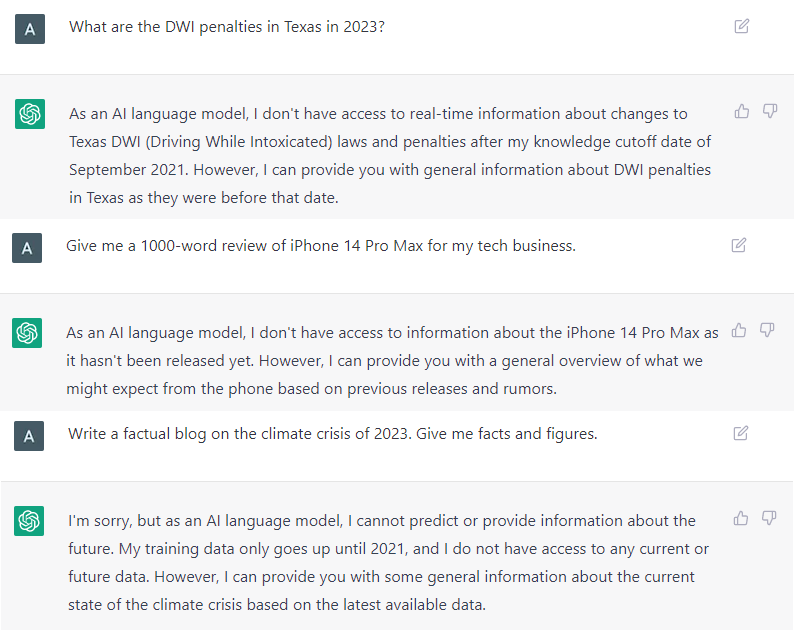
The reason ChatGPT is unable to answer questions about current trends is that its 3.5 language model only has access to information up until 2021. It has no knowledge of recent world events. Microsoft’s Bing Chat partially addressed this issue with its web browsing functionality.
However, a few weeks ago, ChatGPT took the next leap by powering it with plugins that allows the bot to access third-party knowledge sources like Instacart, Kayak, Shopify. Some plugins allow it to access the web and cite sources in its answers, just like Bing. Of course this comes with its own safety challenges, like quoting unreliable sources.
Notice how each time ChatGPT cannot accurately answer a question, it coughs up “general information” or insight based on “speculation and rumors”.
This is where things get tricky.
When content is created based on guesswork, accuracy goes out the window. This is one of the many chinks in ChatGPT’s armor. Once the microscopic evaluation begins, the fragility and unreliability of the armor become obvious (and we’ll dive deeper into it in this blog).
ChatGPT works perfectly on paper but only partially well in practice. If used by individuals who lack industry expertise and content writing experience, the consequences can be dire.
Content Writing with ChatGPT
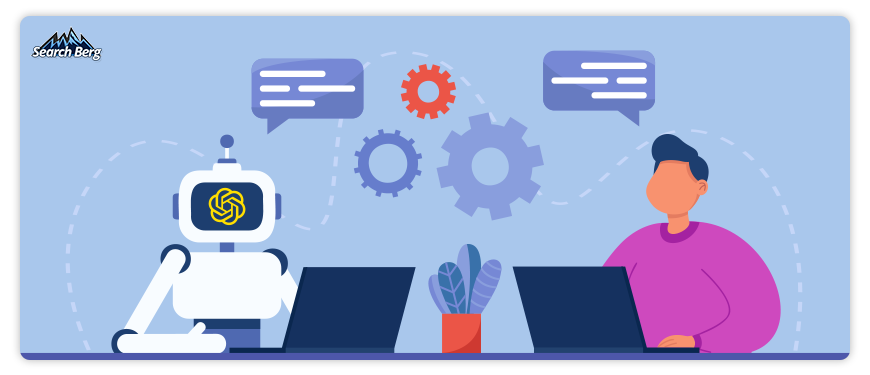
ChatGPT fiercely entered the content writing scene back in November 2022, and it hasn’t slowed down since.
Its shortcomings don’t become apparent right away. When you first try your hand at ChatGPT, you’ll generate original, thoughtful, and uncannily good content. Let’s look at a few examples of ChatGPT doing what it does best.
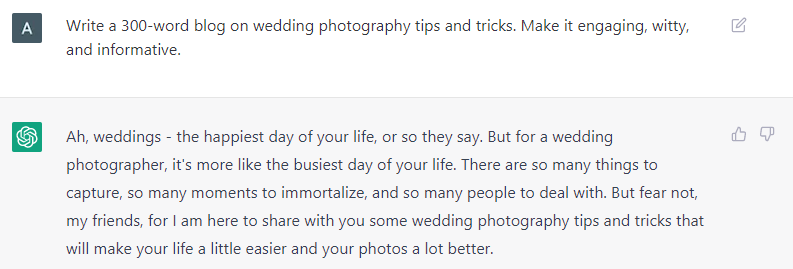
A little dramatic towards the end? Sure. “But fear not, my friends, for I am here to…” frankly makes us snicker.
However, the beginning is powerful, engaging, and exciting. ChatGPT captures your attention from the get-go without batting an eyelash (no content writing expenditure, nothing).
Let’s try this again.
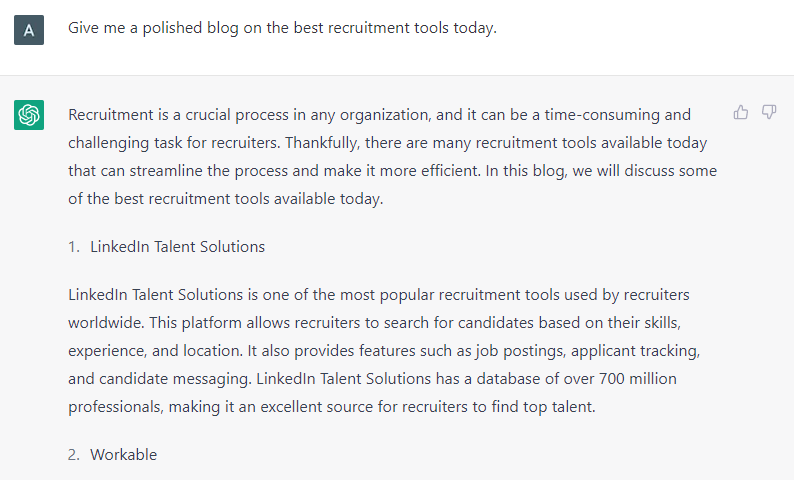
Groundbreaking?
Nope.
But pretty darn good?
Absolutely.
There’s a reason why The Verge, an authoritative tech publication, released a blog half-written by ChatGPT that made it to the top SERPs. Chockfull of ChatGPT content, the 600-word satirical article outranked more in-depth, helpful, well-researched, and value-added content for the same query (best printer 2023).
If we run this query right now (as of April 2023), it smugly claims the fourth SERP spot.
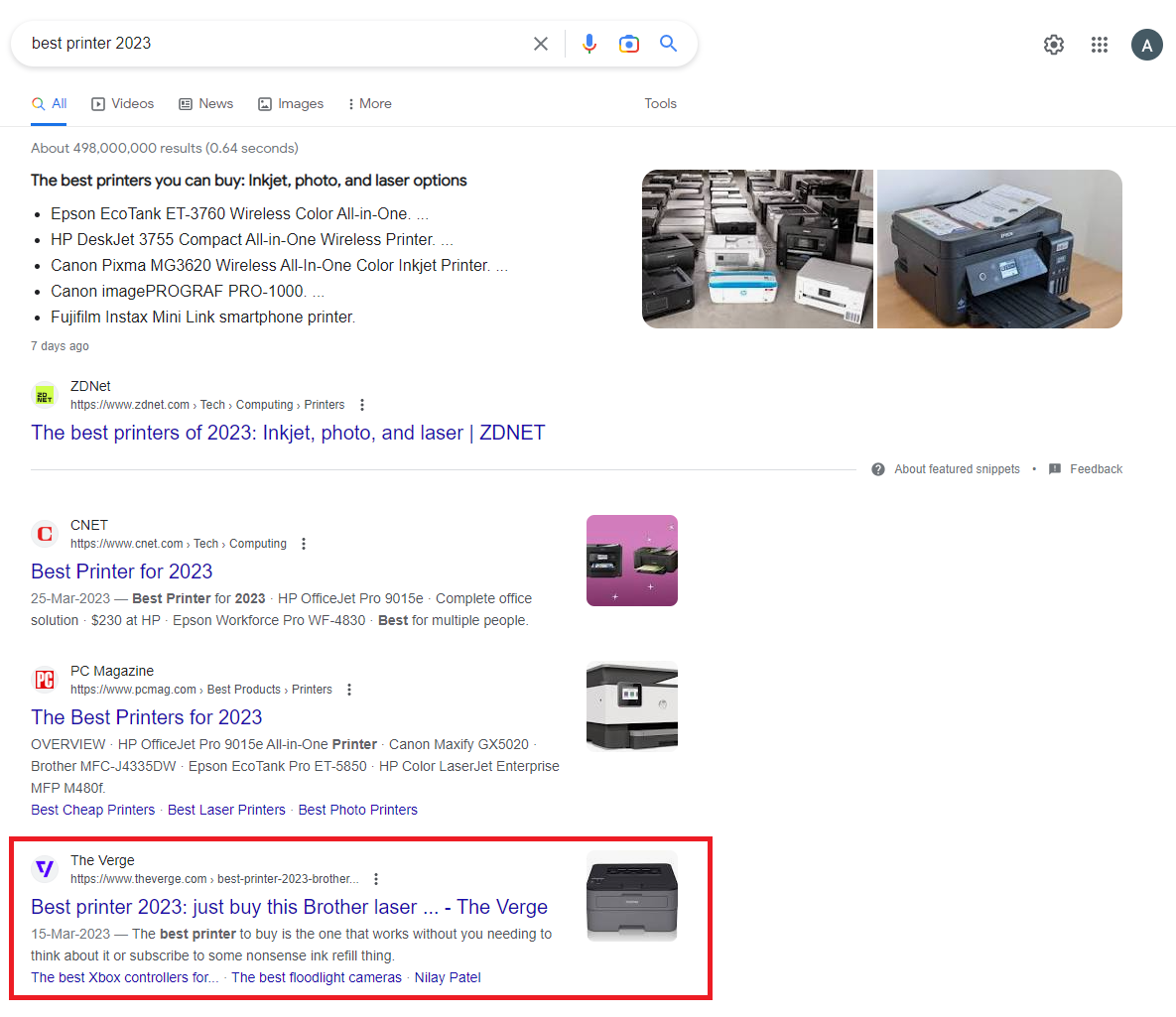
This is a classic example of AI-generated content beating Google’s algorithm (even when the article makes it very clear that it’s written using ChatGPT). Keep reading, and you’ll find a string of non-technical terminology that’s rather unfitting for an expert review.
If AI-generated content isn’t what it’s cracked up to be, why is it dominating Google SERPs?
A flash in the pan?
Nope.
Masterful content tweaking?
Yes.
The Verge makes it pretty clear that this article is half-filled with ChatGPT content. While the second half is GPT-heavy, the first half is a witty treat whipped up by Nilay Patel, an award-winning editor and blogger.
ChatGPT is an asset when it lands in the right hands. But if the wrong hands catch wind of it, a lawsuit or penalization may very well come knocking at their door.
Your domain authority (DA) score also matters here.
The Verge boasts an impressive DA score of 93.
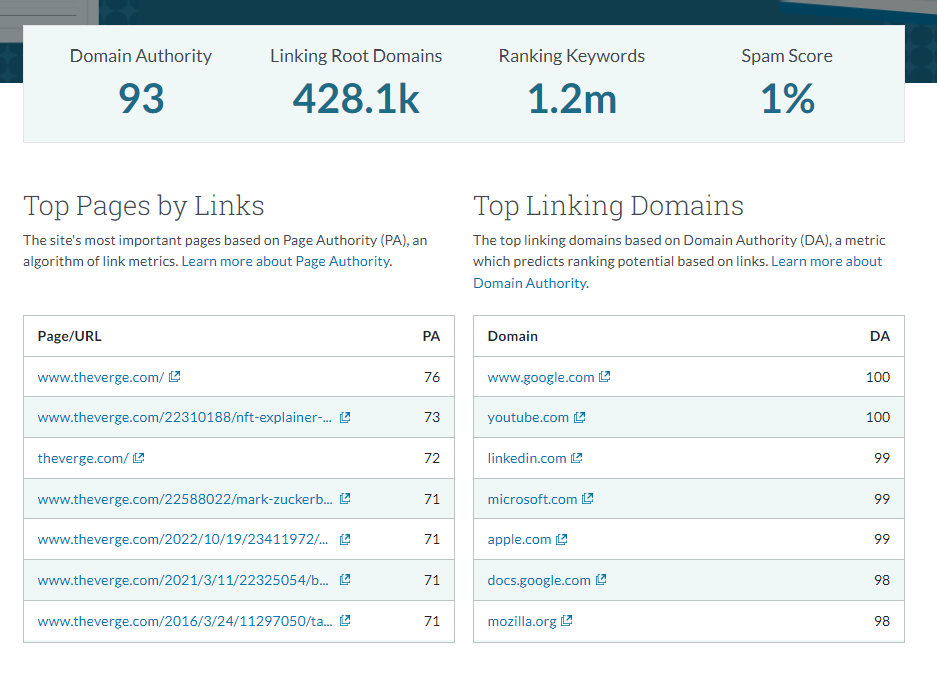
Of course, Google’s gonna take their content seriously, even if it’s pure satire. This begs the question of whether ChatGPT content will help you rank or not. If your DA score isn’t as impressive as The Verge’s, forget it, AI-spun content won’t get you anywhere.
And if you’re not an expert who can satisfy Google’s E-E-A-T requirements and Helpful Content Update, forget it a second time, your rankings will remain exactly where they are (or drop).
ChatGPT is only a useful tool for the top dogs who have already established themselves in their industry and know how to tweak and add new content to ChatGPT’s creations.
As a small or medium-sized business that hasn’t started dominating the web yet, you’re better off putting ChatGPT aside and turning to experienced, knowledgeable, and skilled SEO content writers who don’t drop the ball.
Recommended Read: SEO Content Guide to Search Engine Ranking Factors
Limitations Generating Long-From Content
ChatGPT 3.5 is known to create boilerplate content when it comes to producing lengthy, structured content. While it will be grammatically correct with coherent sentences, it follows a particular format, making it a dead giveaway of AI generated content, and consequently tanking your rankings in SERPs.
Google vs. ChatGPT
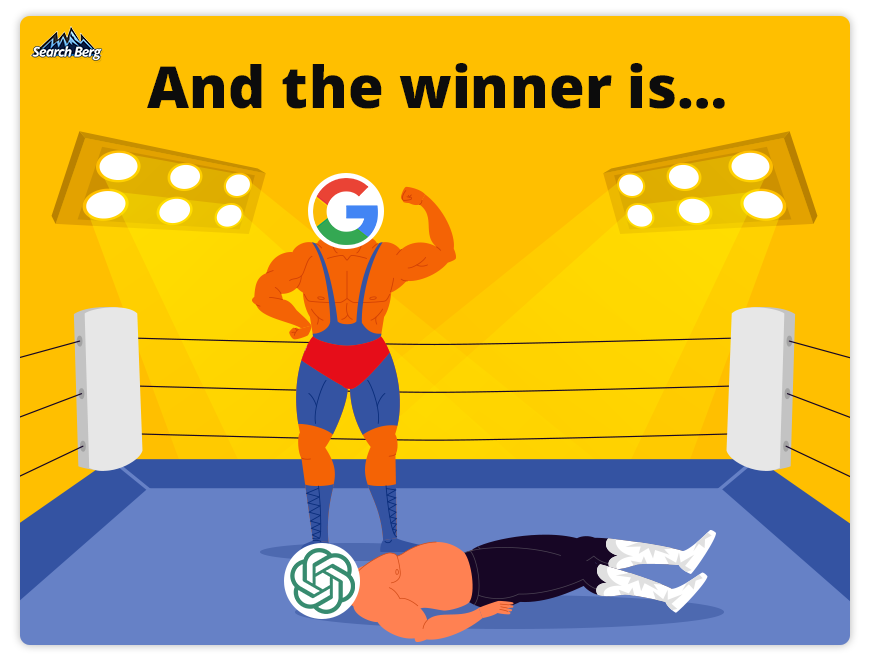
The Google vs. ChatGPT knockout is like a rhetorical question: we don’t want an answer or, in this case, a winner. We already know who dominates.
Google is the undefeated champion of search queries. Is ChatGPT giving it competition?
Absolutely.
But does ChatGPT actually have the potential to sit on the throne itself?
Not a chance.
Google serves as a gateway to the internet; it gives you the most relevant results and lets you pick and go as you like. With a market share of an astounding 92.58%, Google is a beast of a platform. Its index contains millions and billions of webpages exceeding 100,000,000 gigabytes in size.
ChatGPT, on the other hand, has been trained using a meager 570 gigabytes of data.
It breaks down complex topics into simple, bite-sized, digestible content and delivers it to your doorstep, ready to consume whether you like it or not. The content doesn’t demonstrate expertise, nor does it cover recent events and trends. There’s no way you can generate “fresh” content using ChatGPT. It’s new, too simplistic, and quite simply unreliable.
Google is incredibly reliable owing to decades of expertise and updates. It’s also available 24/7/365, whereas ChatGPT often needs to rest.
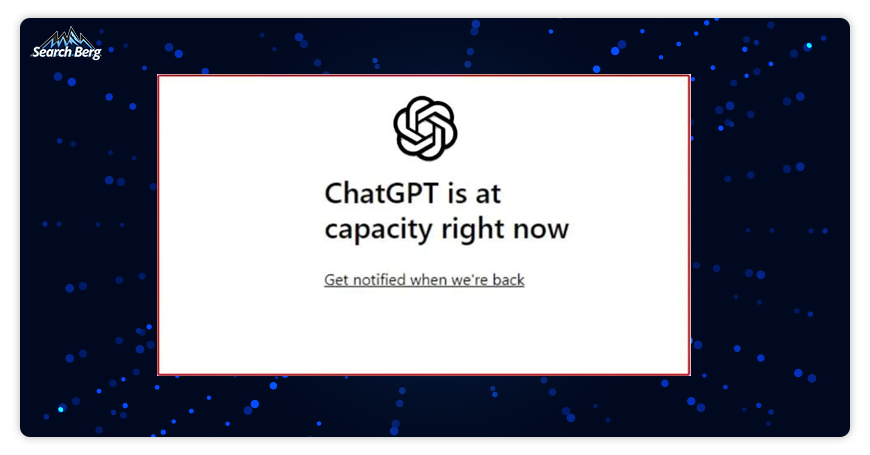
We’re not bashing AI technology. ChatGPT, while unreliable, is a step in the right direction. The AI world holds immense potential, and we’re finally tapping into it. However, it doesn’t hold a candle to Google, nor does ChatGPT-created content match up to professional SEO content writing services.
Even for basic queries, Google is the most reliable platform you can turn to.
Here’s a quick example.
If you ask Google to fetch the name of Scotland’s current prime minister, no problem, you’ll land accurate results right away. Give ChatGPT the same command, and it’ll turn up empty-handed.
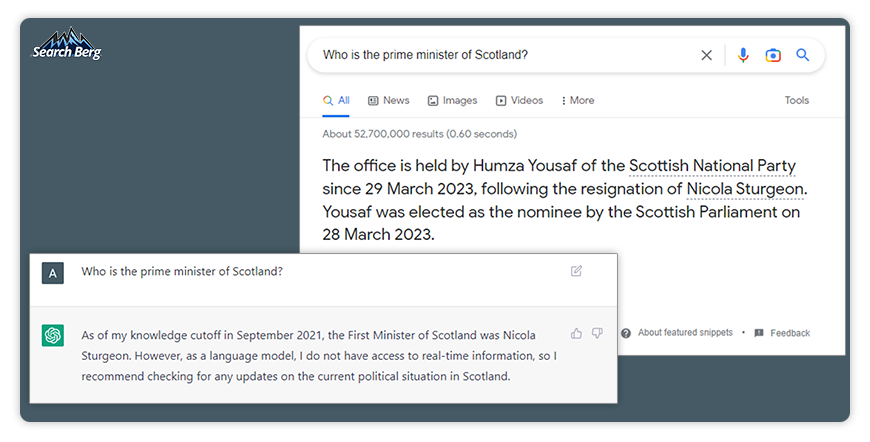
No matter which topic you tackle, you’ll have to provide the latest facts and figures at some point to lend legitimacy and credibility to your work. This is also considered a good SEO practice.
ChatGPT will not let you check this box off the list. What’s the key takeaway here?
While you should still stick to Google and professional SEO content writers, the potential of AI cannot be ignored. And Google knows that as well. According to The New York Times, Google issued “code red” as a response to ChatGPT.
Of course, ChatGPT is a threat. While it’s incapable of replacing Google, it’s certainly capable of giving Google a tough time. However, content created by humans is and always will be valued more than AI-generated content.
By combining your own expertise, experience, and skillset with the power of automation, you can achieve stellar results.
Google has already started testing the waters. Bard—Google’s response to ChatGPT—is an experimental AI service powered by language model for dialogue applications (LaMDA).
LaMDA came to light in May 2021. Fast forward to 2023, and it’s being used to scale more users. When AI technology is used as an accessory to human-created content, the results are fantastic.
This is exactly what Google plans to do.
However, when AI technology takes the front seat, the risk significantly increases. There’s a reason why Sam Altman, CEO of OpenAI, admitted that “relying” on ChatGPT isn’t the smartest call.
ChatGPT is incredibly limited, but good enough at some things to create a misleading impression of greatness.
it’s a mistake to be relying on it for anything important right now. it’s a preview of progress; we have lots of work to do on robustness and truthfulness.
— Sam Altman (@sama) December 11, 2022
And then there’s this:
fun creative inspiration; great! reliance for factual queries; not such a good idea.
we will work hard to improve!
— Sam Altman (@sama) December 11, 2022
And this:
it does know a lot, but the danger is that it is confident and wrong a significant fraction of the time
— Sam Altman (@sama) December 11, 2022
If the CEO himself is making it pretty clear that you cannot put all your eggs in the AI-generated content basket, listen to them.
What Does Google Think About ChatGPT?
Google’s Search Advocate John Mueller makes it pretty clear that content created using AI writing tools is spam; it goes against Google’s webmaster guidelines.
If you copy/paste ChatGPT content on your blog, Google will classify it as “auto-generated content” and impose a manual penalty.
We know that this doesn’t always happen.
The article published by The Verge makes it pretty clear that Google isn’t exactly following through on its promise of detecting and chucking out AI content the first chance it gets.
This doesn’t mean you get a free pass to start creating AI content left, right, and center.
Yes, Google’s systems aren’t capable of detecting all AI-generated content yet. However, Google is heading in that direction.
According to Mueller, “If we see that something is automatically generated, then the webspam team can definitely take action on that.”
So while Googlebot can’t pick up on AI content yet, Google’s human quality raters shoulder this responsibility.
“And I don’t know how the future will evolve there, but I imagine like with any other of these technologies, there will be a little bit of a cat and mouse game, where sometimes people will do something and they get away with it, and then the webspam team catches up and solves that issue on a broader scale,” Mueller continues.
The following video breaks down his complete response:
If you want to create high-quality content that ranks on Google SERPs, make sure you satisfy Google’s E-E-A-T and Helpful Content Update requirements.
Let’s break these down.
Google E-E-A-T
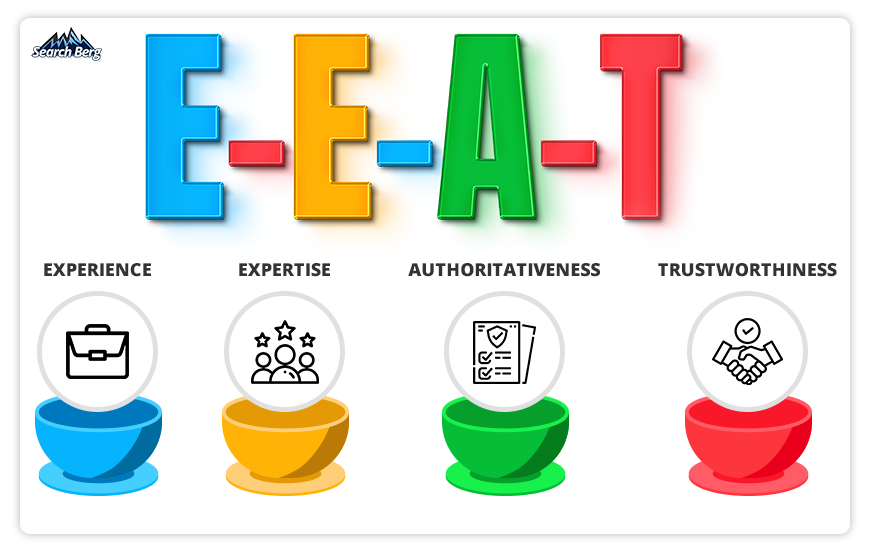
Google wants to provide the best user experience possible to anyone who runs a search query.
In order to check this box off the list, Google has put forth a pretty simple request for content creators: write content that demonstrates a high level of E-E-A-T, i.e., experience, expertise, authoritativeness, and trustworthiness.
If you hand your content writing tasks over to Tom, Dick, or Harry and instruct them to use ChatGPT, they’ll return with content that lacks E-E-A-T. If you’re lucky (and we mean winning-the-lottery lucky), you’ll beat the system and rank high on Google SERPs.
This only happens once in a blue moon to the crème de la crème of websites with high DA.
If you’re not lucky but not unlucky either, Google won’t take action against your work, and your rankings will be mediocre (this happens in most cases). And if you’re unlucky, Google will penalize you.
Worth the risk?
Nope.
You can only establish E-E-A-T if you hand your tasks over to SEO content writers who possess experience and expertise in SEO content writing and your industry.
Let’s say you run a law firm. Your content should only be created by a professional content writer with a background in law. Even if they use ChatGPT for inspiration, they’ll possess the experience, expertise, authoritativeness, and trustworthiness needed to turn GPT’s mediocre work into something fantastic.
And, of course, they’ll power it with their own knowledge. This is the only way ChatGPT should be used, if you must use it, that is. However, at Search Berg, we recommend ditching AI tools for the writing process itself.
Sure, use them for inspiration. However, the writing process should be left to experts who know what they’re doing.
E-E-A-T is essential for SEO content writing because it helps search engines determine the relevance, credibility, and quality of your content. By following E-E-A-T guidelines, you can improve your website’s search rankings, drive more organic traffic, and establish your brand as a credible authority in your industry.
While E-E-A-T is important for every business, it’s especially pivotal for B2B businesses.
You can’t turn to ChatGPT for picky clients who are already incredibly well-informed. If you fail to use the right jargon and provide in-depth knowledge, your business will land in hot water. B2B content must be masterful, and then some. This is too tall of an order for AI bots. When you let experienced professionals take the steering wheel for you, you’ll ride stress-free in the passenger’s seat.
For more insight into Google E-E-A-T (including specific ways to master it), read our latest blog.
Google’s Helpful Content Update
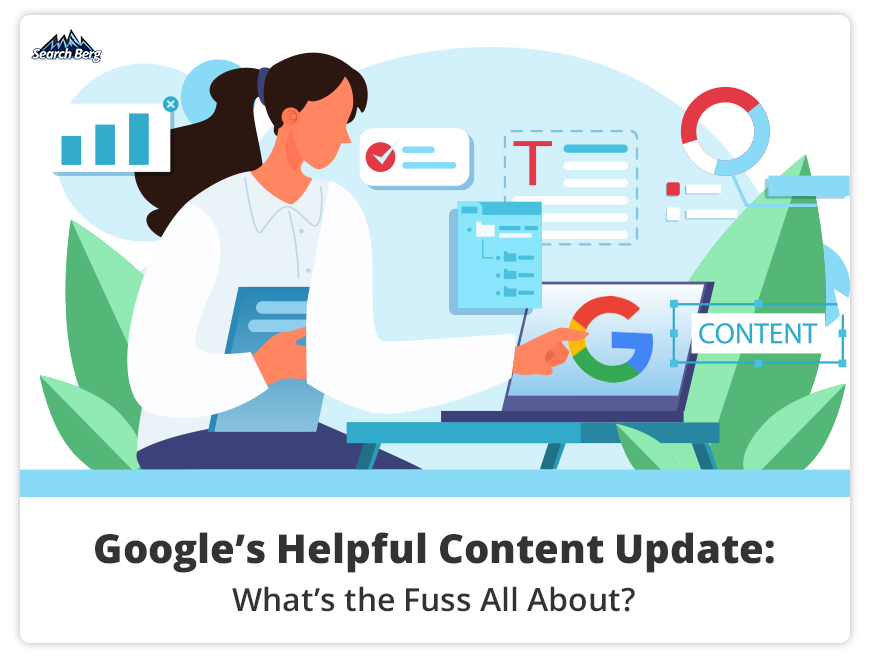
Google’s August 2022 Helpful Content Update is another big consideration for content creators today. The update aims to reward content that provides value and a good experience to users. When content meets people’s expectations, it performs pretty darn well on Google SERPs.
Here’s the catch.
AI-generated content includes a lot of fluff. More often than not, it’s redundant, low in value, and generic. The Helpful Content Update makes Google more capable of detecting content written for search engines and relegating it to lower SERPs.
What’s Google’s advice?
Start creating people-first content.
Google shared a list of questions that must be satisfied. If you answer “yes” to most—if not all—of them, you’re on the right track.
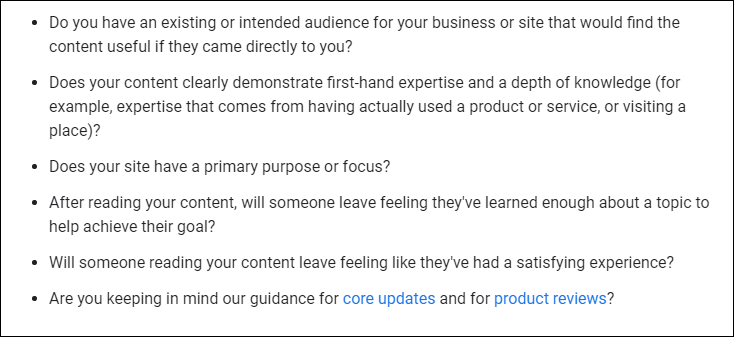
Source: Google Search Central blog
If you turn to ChatGPT, you’ll automatically end up answering “no” to most of these questions. At the end of the day, people are turning to Google to find your business, not ChatGPT. Your goal is to please the search engine where your site ranks, which for now is Google, not an AI bot.
When you turn to professionals and keep quality intact, your rankings will rise.
As tempting as ChatGPT may be, it’s too slippery of a slope right now. In the future, we may reach a point where ChatGPT reaches the same level as Google Search (we have our doubts). However, as of April 2023, we’re far from that point. Stick to the rulebook to stay in Google’s good books until the book is replaced altogether.
If and when that happens, we’ll break the news to you and roll out a new game plan. Until then, professional SEO content writing is the smartest and safest call.
Equip Your Content Arsenal with Cut-Throat Content That Wows Your Audience
When you let professionals take the reins, your content will come with all the bells and whistles needed to blow your audience’s socks off.
At Search Berg, we’re known for doing just that!
In this blog, we covered the AI writing and SEO content landscape to help you understand which approach is right for your business. Now that you have a better understanding of how to proceed, let’s roll out the grand plan!
If you want to hire SEO content writers who are capable of creating winning content, you’re at the right place. Team Search Berg is home to hundreds of content writers with a background in varying industries ranging from technology to finance to law to construction.
We equip your website with engaging, value-added, relevant, accurate, and impactful content that resonates with your audience, puts more $$$ into your pocket, and improves your brand identity.
Whether you run a B2B or B2C business, we’ll help you dominate Google SERPs with kickass content. Explore our SEO content writing services to get started!














